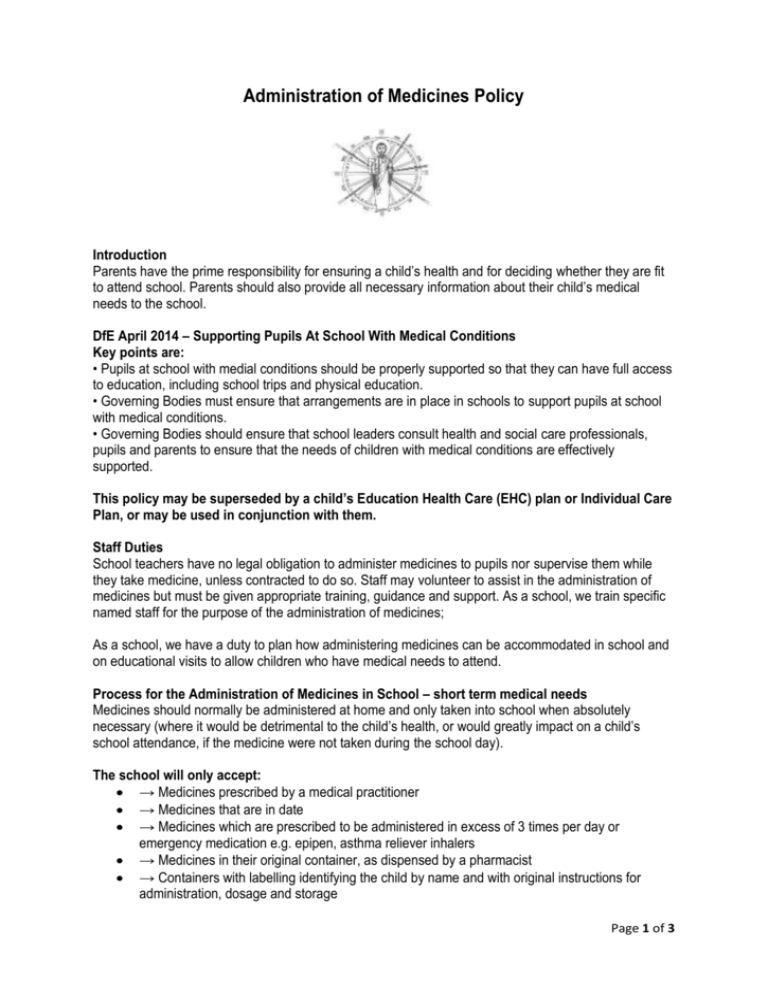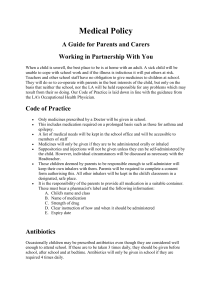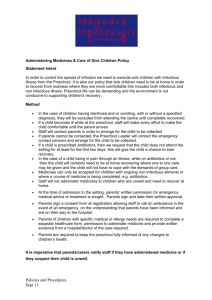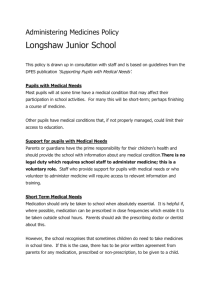Administration of Medicines Policy
advertisement

Administration of Medicines Policy Introduction Parents have the prime responsibility for ensuring a child’s health and for deciding whether they are fit to attend school. Parents should also provide all necessary information about their child’s medical needs to the school. DfE April 2014 – Supporting Pupils At School With Medical Conditions Key points are: • Pupils at school with medial conditions should be properly supported so that they can have full access to education, including school trips and physical education. • Governing Bodies must ensure that arrangements are in place in schools to support pupils at school with medical conditions. • Governing Bodies should ensure that school leaders consult health and social care professionals, pupils and parents to ensure that the needs of children with medical conditions are effectively supported. This policy may be superseded by a child’s Education Health Care (EHC) plan or Individual Care Plan, or may be used in conjunction with them. Staff Duties School teachers have no legal obligation to administer medicines to pupils nor supervise them while they take medicine, unless contracted to do so. Staff may volunteer to assist in the administration of medicines but must be given appropriate training, guidance and support. As a school, we train specific named staff for the purpose of the administration of medicines; As a school, we have a duty to plan how administering medicines can be accommodated in school and on educational visits to allow children who have medical needs to attend. Process for the Administration of Medicines in School – short term medical needs Medicines should normally be administered at home and only taken into school when absolutely necessary (where it would be detrimental to the child’s health, or would greatly impact on a child’s school attendance, if the medicine were not taken during the school day). The school will only accept: → Medicines prescribed by a medical practitioner → Medicines that are in date → Medicines which are prescribed to be administered in excess of 3 times per day or emergency medication e.g. epipen, asthma reliever inhalers → Medicines in their original container, as dispensed by a pharmacist → Containers with labelling identifying the child by name and with original instructions for administration, dosage and storage Page 1 of 3 The school will not accept or administer: → Medicines that are to be administered 1-3 times per day (unless the child is attending after school club and will not return home immediately after 3:00pm) → Paracetamol eg Calpol, unless prescribed in writing by a medical practitioner or for specific short-term medical conditions. → Asprin will not be given to children in this school On accepting medication, the parent must sign a form disclosing all details and giving permission for the medication to be administered by a named person. This medicine must be kept in a locked cupboard (except where storage in a fridge is required) and only accessed by named adults, or with the permission of the Headteacher. When administering, the named adult must complete a record showing the date and time and details/dosage of the medication. In the case of the child being allowed to administer their own medication, this must again be added to the record and counter-signed by the adult. Each child has their own school health record securely stored on the school premises. Medication that is emergency medication such as an epipen or asthma inhaler will be kept in a designated place which can be accessed by all staff at all times. Under no circumstances should a parent send a child to school with any medicines, eg throat sweets/tablets, without informing the school. These could cause a hazard to the child or to another child if found and swallowed. Parents are welcome to come into school to administer medicines themselves that the school refuse to administer, for reasons given above. The member of staff receiving medication from parents should check: Details on the medicine label child's name written instructions provided by parents prescribed dose The time the last dose was given expiry date Medicines should always be provided in the original container which should include the following written information: name of child name of medication plus the form of the medication (e.g. tablets, liquid) dose method of administration time and frequency of administration any side effects (these will be included in the Patient Information Leaflet) expiry date (you may need to seek advice from the Pharmacist) Any member of staff giving medication should check: Details on the medicine label child's name written instructions provided by parents Page 2 of 3 prescribed dose expiry date that all children who are due to receive medication have received their medication that the dose to be given has not already been administered Records A parental consent form must be obtained before the administration of any medication and this form will record the above details. After the parental consent form has been completed by the parent/carer, the office staff will sign at the bottom of the consent form to confirm that school staff will assist with medication. Records must be kept of all medicines administered. The school will keep records for at least 10 years, in case an incident occurs or a parent indicates that they may take legal action. Process for the Administration of Medicines in School – long term medical needs Where a child has long-term medical needs, a care plan must be written with the assistance of the school nurse and in the presence of the parent/guardian of the named child (referring to external professionals’ recommendations where appropriate). This may also result in an individual risk assessment also being required. The care plan must be followed and reviewed at least annually. It is the parent’s responsibility to inform the school of any changes to the child’s condition that may require the details of the care plan to be altered. The Headteacher must ensure that named staff are trained to administer or give the level of care required by the details of the care plan. As a school, we try to ensure that we have sufficient information about the medical condition of any child with long-term medical needs and will request meetings with parents and recognised medical practitioners regularly to provide the correct level of training. Training should be specific to the individual child concerned. There will also be regular/annual training for all staff on more generalised needs eg asthma awareness and epi-pen training, diabetes and epilepsy. The school is well supported by the School Nurse who provides staff with advice and any relevant training on request. October 2014 Page 3 of 3



